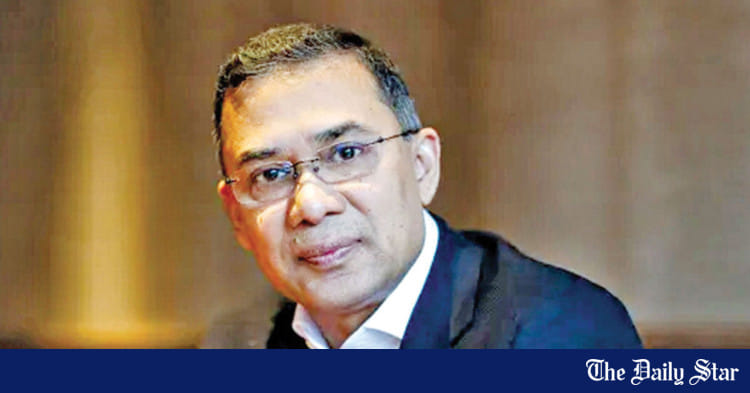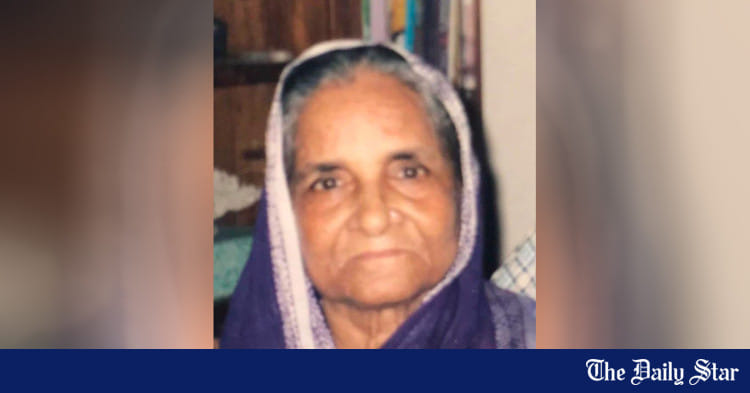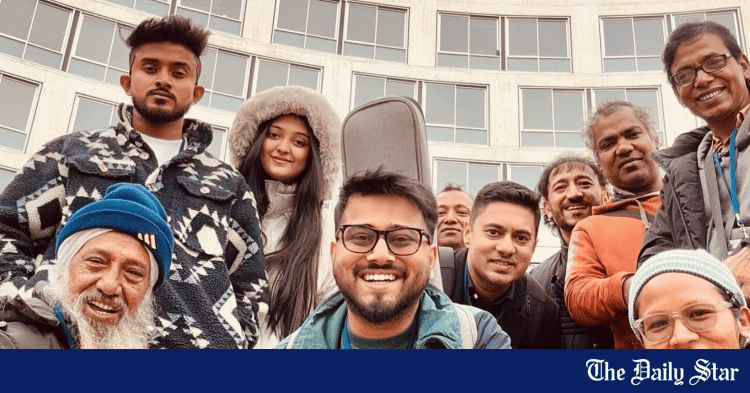President, CA pay homage to language heroes

Photo: PID
President Mohammed Shahabuddin and Chief Adviser Professor Muhammad Yunus have paid rich tributes to the martyrs of the historic Language Movement, marking the Amar Ekushey and the International Mother Language Day.
They separately paid homage by placing wreaths at the Central Shaheed Minar in the capital after 12:01am today, reports BSS.
The president and chief adviser stood in solemn silence for some time as a mark of profound respect to the memories of the Language Heroes.
Dhaka University Vice-Chancellor Professor Niaz Ahmed Khan welcomed them upon their arrival at the Central Shaheed Minar.
Advisers to the interim government, chief justice, chiefs of the three services, freedom fighters, diplomats and high civil and military officials were present on the occasion.

Photo: Rashed Shumon/Star
Later, the Shaheed Minar was opened to the public when hundreds of people from all walks of life placed flowers to recall the supreme sacrifice of the language heroes on this day in 1952.
The day will also be observed around the world since UNESCO recognised the 21st February (Ekushey February) as the International Mother Language Day on November 17, 1999.
This year's UNESCO topic of the day is "Make Languages Count for Sustainable Development".
Earlier, Chief Adviser Professor Muhammad Yunus today issued a message paying rich tribute to people of all languages in the world, including Bangla, on the occasion of the great Martyrs' Day and the International Mother Language Day-2025.
In his message, he said the Bengali nation, which had endured centuries of enslavement and domination, achieved its first victory in its struggle for independence on February 21, 1952.
The language movement holds special significance in the history of the Bengali nation's liberation movement, he added.

Photo: Rashed Shumon/Star
The day's programmes include: paying respect to language martyrs by placing wreaths at the Central Shaheed Minar beside Dhaka Medical College and Hospital and other local Shaheed Minars across the country at one minute past zero hour, holding discussions highlighting the significance of February 21, wearing black badge, keeping national flag half mast, hoisting black flag atop the buildings, paying tributes to the martyr's graves in City's Azimpur and bringing out "Provat Feri".
The day is a public holiday.
In observance of the day, the Central Shaheed Minar premises was decorated with paintings, graffiti, buntings and selected verses in the mother language.
Tight security measures have been enforced around the Central Shaheed Minar, its adjoining areas and Azimpur graveyard of the language martyrs.
Different political, social, cultural, professional bodies have taken various programmes including cultural functions to observe the Amar Ekushey in a befitting manner.
The national flags will be kept half-mast at all the buildings of government, semi-government, autonomous and private organisations and educational institutions.
All educational institutions, local government bodies, district and upazila administrations, Bangladesh missions abroad will take proper measures to observe the day.
Fateha and Qurankhwani will be offered at Azimpur graveyard and special prayers will be arranged at mosques and all other places of prayers across the country seeking eternal peace of the souls of the language martyrs.
On the occasion, road islands and other important places in the capital will be decorated with festoons inscribed with letters of different languages including Bangla.
Public and private media will air special programme while newspapers will publish special supplements marking the day.
Bangladesh missions abroad will organise different programmes, including placing wreaths at Shaheed Minar, discussions on Bangabandhu and Language Movement, and book and photo exhibitions where diplomats of different countries and Bangladeshi expatriates will join.
Marking the day, Bangla Academy, Bangladesh Shilpakala Academy, Kabi Nazrul Institute, National Book Centre, Islamic Foundation, Bangladesh National Museum, Department of Archaeology, Department of Public Libraries, International Mother Language Institute, Department of Archives and Library, Bangladesh Folk Art and Crafts Foundation, Bangladesh Shishu Academy, Small Ethnic Groups Cultural Institute, three districts in hill tracts, Tribal Cultural Academy in Birishiri of Netrokona, Rajshahi Divisional Ethnic Minority Cultural Academy (RDEMCA), Manipuri Lalitkala Academy, Cox's Bazar Cultural Centre and other organisations and institutions will organise various events.
On February 21 in 1952, Salam, Rafique, Shafique, Jabbar and Barkat embraced martyrdom in police firing in front of the Dhaka Medical College and Hospital (DMCH) as they took to the street to intensify the campaign to establish Bangla as the state language of the then Pakistan, sowing the seeds of subsequent movements for the country's independence.
They were killed as police opened fire on students demonstrating under the All-Party Students Action Committee against conspiracies of Pakistani rulers to declare "Urdu" as the only state language.
The movement for Bangla, however, did not stop and Pakistan government on February 29, 1956 was compelled to recognise Bangla as one of the state languages besides Urdu.
The decision, however, could not stop the movement against repression and misrule of Pakistani government that subsequently led the Bangalee to the War of Independence and the emergence of Bangladesh.
Photo: PID
President Mohammed Shahabuddin and Chief Adviser Professor Muhammad Yunus have paid rich tributes to the martyrs of the historic Language Movement, marking the Amar Ekushey and the International Mother Language Day.
They separately paid homage by placing wreaths at the Central Shaheed Minar in the capital after 12:01am today, reports BSS.
The president and chief adviser stood in solemn silence for some time as a mark of profound respect to the memories of the Language Heroes.
Dhaka University Vice-Chancellor Professor Niaz Ahmed Khan welcomed them upon their arrival at the Central Shaheed Minar.
Advisers to the interim government, chief justice, chiefs of the three services, freedom fighters, diplomats and high civil and military officials were present on the occasion.
Photo: Rashed Shumon/Star
Later, the Shaheed Minar was opened to the public when hundreds of people from all walks of life placed flowers to recall the supreme sacrifice of the language heroes on this day in 1952.
The day will also be observed around the world since UNESCO recognised the 21st February (Ekushey February) as the International Mother Language Day on November 17, 1999.
This year's UNESCO topic of the day is "Make Languages Count for Sustainable Development".
Earlier, Chief Adviser Professor Muhammad Yunus today issued a message paying rich tribute to people of all languages in the world, including Bangla, on the occasion of the great Martyrs' Day and the International Mother Language Day-2025.
In his message, he said the Bengali nation, which had endured centuries of enslavement and domination, achieved its first victory in its struggle for independence on February 21, 1952.
The language movement holds special significance in the history of the Bengali nation's liberation movement, he added.
Photo: Rashed Shumon/Star
The day's programmes include: paying respect to language martyrs by placing wreaths at the Central Shaheed Minar beside Dhaka Medical College and Hospital and other local Shaheed Minars across the country at one minute past zero hour, holding discussions highlighting the significance of February 21, wearing black badge, keeping national flag half mast, hoisting black flag atop the buildings, paying tributes to the martyr's graves in City's Azimpur and bringing out "Provat Feri".
The day is a public holiday.
In observance of the day, the Central Shaheed Minar premises was decorated with paintings, graffiti, buntings and selected verses in the mother language.
Tight security measures have been enforced around the Central Shaheed Minar, its adjoining areas and Azimpur graveyard of the language martyrs.
Different political, social, cultural, professional bodies have taken various programmes including cultural functions to observe the Amar Ekushey in a befitting manner.
The national flags will be kept half-mast at all the buildings of government, semi-government, autonomous and private organisations and educational institutions.
All educational institutions, local government bodies, district and upazila administrations, Bangladesh missions abroad will take proper measures to observe the day.
Fateha and Qurankhwani will be offered at Azimpur graveyard and special prayers will be arranged at mosques and all other places of prayers across the country seeking eternal peace of the souls of the language martyrs.
On the occasion, road islands and other important places in the capital will be decorated with festoons inscribed with letters of different languages including Bangla.
Public and private media will air special programme while newspapers will publish special supplements marking the day.
Bangladesh missions abroad will organise different programmes, including placing wreaths at Shaheed Minar, discussions on Bangabandhu and Language Movement, and book and photo exhibitions where diplomats of different countries and Bangladeshi expatriates will join.
Marking the day, Bangla Academy, Bangladesh Shilpakala Academy, Kabi Nazrul Institute, National Book Centre, Islamic Foundation, Bangladesh National Museum, Department of Archaeology, Department of Public Libraries, International Mother Language Institute, Department of Archives and Library, Bangladesh Folk Art and Crafts Foundation, Bangladesh Shishu Academy, Small Ethnic Groups Cultural Institute, three districts in hill tracts, Tribal Cultural Academy in Birishiri of Netrokona, Rajshahi Divisional Ethnic Minority Cultural Academy (RDEMCA), Manipuri Lalitkala Academy, Cox's Bazar Cultural Centre and other organisations and institutions will organise various events.
On February 21 in 1952, Salam, Rafique, Shafique, Jabbar and Barkat embraced martyrdom in police firing in front of the Dhaka Medical College and Hospital (DMCH) as they took to the street to intensify the campaign to establish Bangla as the state language of the then Pakistan, sowing the seeds of subsequent movements for the country's independence.
They were killed as police opened fire on students demonstrating under the All-Party Students Action Committee against conspiracies of Pakistani rulers to declare "Urdu" as the only state language.
The movement for Bangla, however, did not stop and Pakistan government on February 29, 1956 was compelled to recognise Bangla as one of the state languages besides Urdu.
The decision, however, could not stop the movement against repression and misrule of Pakistani government that subsequently led the Bangalee to the War of Independence and the emergence of Bangladesh.











